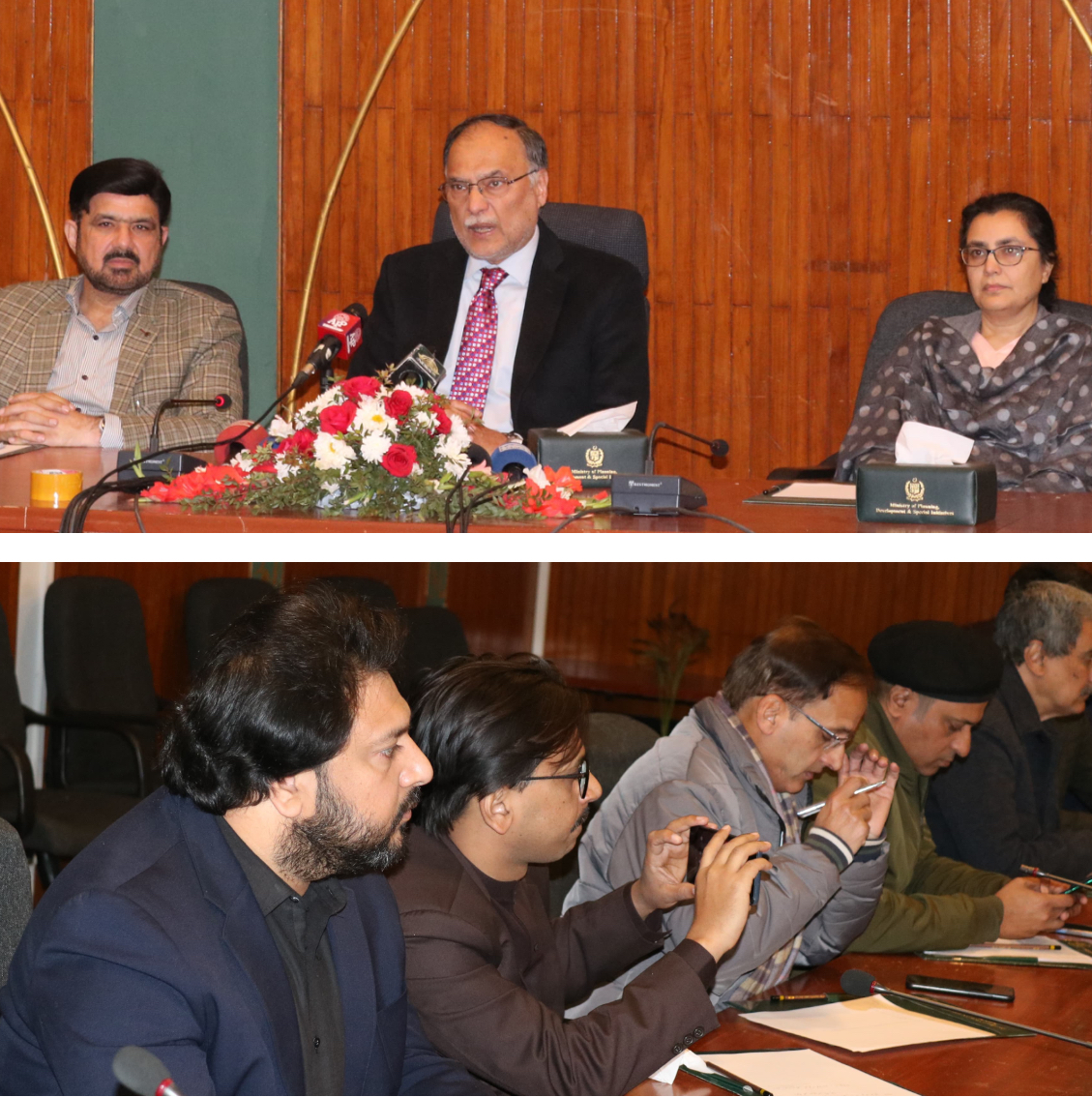
اسلام آباد – 3 جنوری 2025 (کامران راجہ) : وفاقی وزیر برائے منصوبہ بندی، ترقی، اور خصوصی اقدامات احسن اقبال نے آج وزارت منصوبہ بندی میں ایک اڑان پاکستان کے تحت اقدامات اور منصوبوں کے نفاذ کی حکمت عملی کے حوالے سے پریس کانفرنس سے خطاب کرتے ہوئے حکومت پاکستان کے انقلابی منصوبے “اڑان پاکستان” کی تفصیلات بیان کیں۔
یہ منصوبہ 31 دسمبر 2024 کو وزیر اعظم میاں محمد شہباز شریف نے لانچ کیا تھا۔ وزیر نے اس منصوبے کے اہم اہداف، حکمت عملیوں، اور نفاذ کے طریقہ کار پر روشنی ڈالی اور ملک کو 2047 تک 3 کھرب ڈالر کی معیشت میں تبدیل کرنے کے عزم کا اعادہ کیا۔
احسن اقبال نے کہا کہ اڑان پاکستان نہ صرف ایک وژن ہے بلکہ یہ ایک قومی عہد ہے جو سماجی و اقتصادی چیلنجز کو حل کرنے، ملک کی پوشیدہ صلاحیتوں کو اجاگر کرنے، اور پائیدار ترقی کے مواقع پیدا کرنے کے لیے ترتیب دیا گیا ہے۔ انہوں نے کہا کہ اس منصوبے کی کامیاب عملدرآمد کو یقینی بنانے کے لیے تمام ریاستی اداروں اور وزارتوں کے درمیان ہم آہنگی پیدا کی جائے گی۔
احسن اقبال نے وضاحت کی کہ اڑان پاکستان گزشتہ منصوبوں جیسے وژن 2010 اور وژن 2025 کی ناکامیوں سے سبق لیتے ہوئے ترتیب دیا گیا ہے۔ ان منصوبوں کو سیاسی عدم استحکام اور پالیسی کے تسلسل کی کمی نے متاثر کیا۔ اڑان پاکستان میں پالیسی کے تسلسل، تمام اسٹیک ہولڈرز کی شمولیت، اور قابل پیمائش نتائج پر زور دیا گیا ہے۔ یہ منصوبہ سیاسی مداخلت سے محفوظ رکھنے کے لیے ایک مضبوط نفاذ کے نظام کے تحت ترتیب دیا گیا ہے جو تمام صوبوں، وزارتوں، اور شعبوں کو ایک پلیٹ فارم پر یکجا کرتا ہے۔
وفاقی وزیر نے کہا کہ اڑان پاکستان کے اہداف حقیقت پسندانہ ہیں اور یہ منصوبہ عالمی بہترین عملی طریقوں پر مبنی ہے۔ انہوں نے کہا کہ یہ منصوبہ ملائیشیا، ترکی، اور جنوبی کوریا جیسے ممالک سے متاثر ہو کر ترتیب دیا گیا ہے، جنہوں نے اسی نوعیت کے خاکوں کے ذریعے اپنی معیشتوں کو تبدیل کیا۔
انہوں نے پاکستان کی 65 فیصد نوجوان آبادی کو ملک کی سب سے بڑی طاقت قرار دیا اور کہا کہ نوجوانوں کو تعلیم، ہنر کی ترقی، اور ڈیجیٹل اقدامات کے ذریعے بااختیار بنانا اڑان پاکستان کے اہم مقاصد میں سے ایک ہے۔
احسن اقبال نے منصوبے کی مالیاتی حکمت عملی پر روشنی ڈالتے ہوئے کہا کہ حکومت عوامی و نجی شراکت داری (PPP) پر انحصار کرے گی۔ یہ شراکت داری بڑے پیمانے پر بنیادی ڈھانچے کے منصوبوں کے لیے مالیاتی بوجھ کو کم کرے گی اور وسائل کو متحرک کرے گی۔ انہوں نے بتایا کہ حکومت بین الاقوامی ترقیاتی فنڈز، نجی شعبے کی سرمایہ کاری، اور ٹیکس نظام کو مضبوط بنانے جیسے جدید مالیاتی ماڈلز کو ترجیح دے رہی ہے۔
وزیر نے کہا کہ سی پیک اڑان پاکستان کے نفاذ میں مرکزی حیثیت رکھتا ہے۔ انہوں نے کہا کہ سی پیک کے ذریعے علاقائی تجارت، رابطے، اور بنیادی ڈھانچے کی ترقی کو فروغ دیا جائے گا۔ توانائی اور نقل و حمل کے منصوبوں کو توسیع دی جا رہی ہے تاکہ صنعتی ترقی میں مدد مل سکے اور وسطی ایشیا، مشرق وسطیٰ، اور افریقہ کی منڈیوں تک رسائی میں بہتری آئے۔
احسن اقبال نے اڑان پاکستان کے بنیادی ستون، 5Es فریم ورک، کی تفصیلات بیان کیں۔ برآمدات کو معیشتی ترقی کی بنیاد قرار دیتے ہوئے کہا کہ اس منصوبے کے تحت سالانہ 60 ارب ڈالر کی برآمدات کا ہدف مقرر کیا گیا ہے۔
ڈیجیٹل معیشت کے حوالے سے انہوں نے کہا کہ پاکستان کی فری لانسنگ انڈسٹری کو 5 ارب ڈالر تک بڑھایا جائے گا اور ہر سال 2 لاکھ آئی ٹی گریجویٹس پیدا کیے جائیں گے۔ ماحولیاتی پائیداری کے لیے گرین ہاؤس گیسوں کے اخراج کو 50 فیصد تک کم کرنا، قابل کاشت رقبے کو 20.3 ملین ایکڑ تک بڑھانا، اور پانی کے ذخیرے کی گنجائش کو 10 ملین ایکڑ فٹ تک بڑھانا شامل ہے۔
احسن اقبال نے نیشنل اکنامک ٹرانسفارمیشن یونٹ (NETU) کے قیام پر روشنی ڈالی جو اڑان پاکستان کے نفاذ اور جوابدہی کو یقینی بنائے گا۔ NETU کلیدی کارکردگی کے اشاریوں (KPIs) کے ذریعے منصوبے کی پیش رفت کی نگرانی کرے گا۔
احسن اقبال نے تمام پاکستانیوں سے اپیل کی کہ وہ اڑان پاکستان کے لیے یکجا ہوں۔ انہوں نے کہا کہ نجی شعبہ، تعلیمی ادارے، اور میڈیا اس منصوبے کی کامیابی میں اہم کردار ادا کر سکتے ہیں۔ انہوں نے کہا، “مل جل کر ہم ایک خوشحال، جدید اور خود مختار پاکستان بنا سکتے ہیں۔”